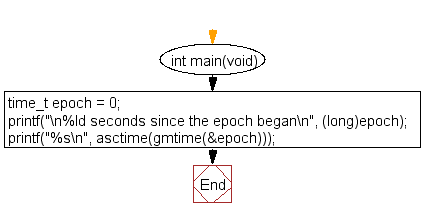C Exercises: Show the start of the epoch
C Date Time: Exercise-10 with Solution
Write a program in C to show the start of the epoch.
Note : epoch means the beginning of a period in the history of someone.
Sample Solution:
C Code:
#include <stdio.h>
#include <time.h>
int main(void)
{
time_t epoch = 0;
printf("\n%ld seconds since the epoch began\n", (long)epoch);
printf("%s\n", asctime(gmtime(&epoch)));
}
Sample Output:
0 seconds since the epoch began Thu Jan 01 00:00:00 1970
Flowchart:

C Programming Code Editor:
Contribute your code and comments through Disqus.
Previous: Write a program in C to show the first of calendar time.
Next: C Function Exercises Home
What is the difficulty level of this exercise?
Test your Programming skills with w3resource's quiz.
C Programming: Tips of the Day
Static variable inside of a function in C
The scope of variable is where the variable name can be seen. Here, x is visible only inside function foo().
The lifetime of a variable is the period over which it exists. If x were defined without the keyword static, the lifetime would be from the entry into foo() to the return from foo(); so it would be re-initialized to 5 on every call.
The keyword static acts to extend the lifetime of a variable to the lifetime of the programme; e.g. initialization occurs once and once only and then the variable retains its value - whatever it has come to be - over all future calls to foo().
Ref : https://bit.ly/3fOq7XP
- New Content published on w3resource:
- HTML-CSS Practical: Exercises, Practice, Solution
- Java Regular Expression: Exercises, Practice, Solution
- Scala Programming Exercises, Practice, Solution
- Python Itertools exercises
- Python Numpy exercises
- Python GeoPy Package exercises
- Python Pandas exercises
- Python nltk exercises
- Python BeautifulSoup exercises
- Form Template
- Composer - PHP Package Manager
- PHPUnit - PHP Testing
- Laravel - PHP Framework
- Angular - JavaScript Framework
- Vue - JavaScript Framework
- Jest - JavaScript Testing Framework
